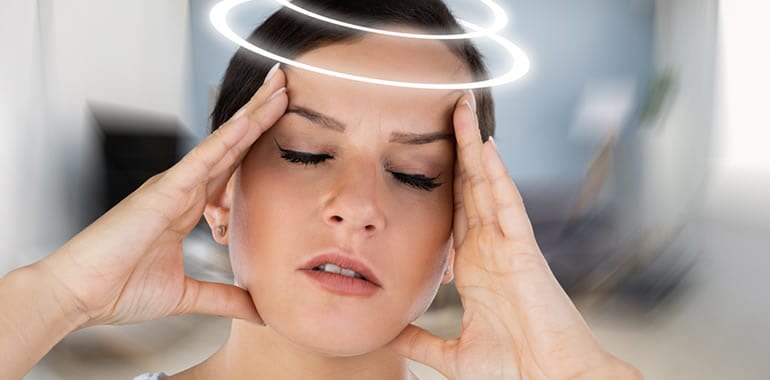
If you answered YES to any of the above questions, then you may be experiencing some vestibular symptoms. What does that mean? It can be difficult to describe the symptoms that you are feeling and more difficult to delineate if you are feeling dizzy, spinning, foggy, off balance, light headed and so much more.
Vestibular symptoms can include dizziness, feeling off balance on your feet, brain fog or difficulty concentrating, vertigo, motion sickness, ringing in your ears, hearing loss, nausea or vomiting, change in your vision (blurry vision), changes to your cognition (short-term memory) and even psychological changes (these symptoms wear on the body).
Whew, that is a lot of symptoms all wrapped up into one word- vestibular!
Our vestibular system helps us to stay balanced and coordinate eye and head movements. Vertigo and dizziness are the most common symptoms when you are experiencing vestibular dysfunction. But there are so many more symptoms that you may be having, and you can see the long list above.
Vertigo is the abnormal sensation of movement or feeling like you are spinning. Dizziness is a general term that can mean you are feeling lightheaded, unsteady, or even like you are going to faint. One of the most important things is being able to describe what you are feeling in more words than just dizzy.
What causes this spinning or dizzy sensation you may wonder?
In our inner ear we have crystals that are supposed to be in certain places or canals. These crystals can be dislodged or move from one canal to another causing us to feel dizzy, lightheaded, nauseous and more. When you turn your head in different positions, the movement of the crystals in a different canal than they are meant to be in sends a false message to the brain telling our body that our head is spinning. It can also cause our eyes to move quickly in a nystagmus making us feel like our surroundings are moving when they are actually still in place.
There are many different conditions related to our vestibular system being off-balance that have different causes…check some of the most common one’s out below.
BPPV
This stands for benign (not life-threatening), paroxysmal (comes on sudden and lasts briefly), positional (set off with head movements), vertigo (false sensation of movement)
BPPV is the most common vestibular disorder and is caused by too many crystals in the inner ear being dislodged into a different canal that they are not supposed to be in. Too many of the crystals in the wrong canal causes the fluid inside the canal to not be able to flow properly sending false signals to the brain. This condition can be treated very effectively with vestibular physical therapy to relieve your symptoms and teach you tools if they return in the future.
Concussion Injuries
This is when there is an injury to the brain from a jolt, impact hit or bump to the head. A strong shaking to the body such as whiplash can also cause a concussion as the brain bounces or twists in our skull. A concussion is classified as a traumatic brain injury and can cause damage to our brain cells. Numerous concussions to the brain can be extremely dangerous and needs medical attention.
Concussion symptoms include headaches, illness, vision changes, slurring your speech, ringing in your ears, drowsy, brain fog, difficulty concentrating. It is essential that you seek treatment with a vestibular physical therapy specialist to be able to get you back to doing all the sports, school, work and things that you love as soon as possible.
Vestibular Migraines
when you have a migraine (severe, intense headache) that is accompanied by sensitivity to light, intolerance to noise, nausea and vomiting are common too. Hormonal changes, stress, foods, medications, sleep disturbance and even weather conditions can trigger a vestibular migraine. The treatment is focused on helping alleviate your symptoms, identify and prevent your triggers for the future.
Cervicogenic Dizziness
dizziness or generally feeling disoriented that is worsened with head movements. Dizziness and lightheadedness are common with neck pain, stiffness and headaches. Treatment includes being seen by a vestibular physical therapist to reduce tension along the spine, stretch the surrounding structure and improve postural alignment.
Meniere’s Disease
chronic, vestibular disorder that it not curable and causes recurring symptoms of hearing loss, vertigo, dizziness and more. The attacks can last from 20 minutes to 24 hours occurring each week or even separated by years. The treatment is focused on reducing the symptoms when an attack occurs and long-term reducing the frequency of attacks.
Labyrinthitis
an infection in the inner ear or the nerve connecting the inner eat to the brain causing dizziness that can be acute, chronic or both. This can also be treated with vestibular rehabilitation exercises, especially when it is chronic in nature.
There are many more vestibular conditions that you may be experiencing that are not listed above as this just brushes the surface of what may be going on with your body or inner ear.
Some things to think about and jot down before you head to the doctor are:
There are many different tests that can be performed to figure out what type of condition your body is struggling with and some things to do in the meantime are:
One of the most amazing ways you can help your body and learn tips, tricks, and techniques to improve your symptoms is to get the right help for you! That can include vestibular physical therapy.
Vestibular rehab is a specialized form of treatment to help with the use of exercise to reduce vertigo, dizziness, balance deficits, concussion symptoms and visual deficits that are related to a vestibular dysfunction. There are many ways to teach your body to manage the symptoms that you are experiencing and help to reduce them through movements of your head, eyes and all the balance systems.
A side note about balance...
We use 3 systems to help our body balance when we are sitting, standing, walking, playing sports and doing all our activities.
- 1Visual system - we use our eyes to help us balance (if you don’t believe me, close your eyes and see how your balance can change without having the visual feedback to our brain -make sure there is something close by in case you tip over)
- 2Somatosensory system – what we can feel and touch meaning our feet hitting the ground (uneven surfaces, shoes, walking on ice, through rain, snow and more all affect this system)
- 3Vestibular system - our inner ear and the connections to our brain to help us process information about where our head is in space
All of these systems give our body and brain information about where we are in relation to the ground and our surroundings so that we can move without falling.
Our balance is something that we can take for granted as we don’t even blink an eye to walk across a gravel driveway, ride our bikes through the neighborhood, walk through the grass, get out of bed in the middle of the night without stumbling and more. Balance is essential and can be affected at any age!
One of the best things about vestibular rehabilitation is that you will get homework to continue making progress and reducing your symptoms. Your therapist will give you a guided prescription of the best movements for your body to practice so that things improve for you sooner rather than later.
What are some things to consider and think about when you are living with a vestibular disorder as some of the conditions do not completely resolve or can reoccur…?
Get help to cope with activities such as travelling, dining out, sleeping position, hygiene, stress reduction, lighting in your house and how that affects your body, understanding your triggers AND support groups
What else can you do?
Talk with one of our vestibular specialists to understand more what is going on with your body so that it makes sense how things can change and improve. A FREE Breakthrough visit is the best way to start your journey with vestibular rehabilitation to make sure that you have found the best place for you!
Looking forward to helping you live your best life without stressing about dizziness, spinning, fogginess, nausea and more!



